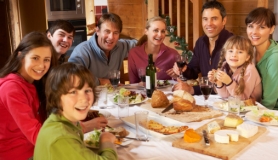Create Traditions
Whether it’s making pancakes for dinner on Sunday nights or taking a full moon walk, unique family rituals strengthen ties like nothing else. ‘Traditions give children a sense of identity and belonging,’ says Richard Eyre, coauthor of The Happy Family. ‘They may seem insignificant to adults, but kids hang on to them.’ The Eyres have celebrated family birthdays in special ways since their children were small. ‘Because mine is in autumn, we always rake a big pile of leaves and jump in them,’ says Eyre. The year three of his nine children, now ages 16 to 30, left home, he opened the mail on his birthday to find three separate envelopes, each with a leaf inside. ‘It was each child’s way of saying ‘I’m still part of the family,’ he says.
Clean up as a Clan
Who knew that excavating the garage together could yield more than ten-year-old paint tins? Doing chores as a family can be a major bliss booster. You work, you talk, you get closer. ‘Children might grumble when they’re helping wash dishes or sort laundry, but these things create a sense of achievement and connection,’ says Nick Stinnett, author of Fantastic Families. Even running everyday errands with your child, whether walking the dog or going to the petrol station, can provide short but sweet bonding time.
Rally Round the Table
Families who eat together bond better than those who eat at separate times and spaces. Sitting around the table - or even just grating carrots in the kitchen - encourages kids and parents to relax and share what’s on their mind. If your schedule doesn’t allow for family dinners as often as you’d like, consider bonding over breakfast. The Geddes family of New York manages to have dinner together a few nights a week, but they make sure to sit down to eat every morning. ‘It can be hectic,’ says Jennifer Geddes, mother of two girls, ages 18 months and 4 years, ‘but we count on that time together before we go our separate ways.’
Show Support
If you want to build team spirit, encourage your family to be cheerleaders. In a survey of 150 families conducted by Rutgers University in New Jersey, those who seemed most content - and had the most fun together - also expressed their support most often. You can foster this kind of alliance just by keeping everyone up-to-date on one another’s lives, says Michele Borba, author of Building Moral Intelligence. The more your children know about their siblings’ schedules, the easier it is for them to say, ‘Good luck with your test” or “Don’t worry. I was scared on the first day of school too.’
Nurture a Spiritual Side
Whether or not they follow an organized religion, happy families tend to spend time reflecting on gratitude and blessings. Doing that out loud in the evenings with sons Nic, 8, and Zak, 5, is the most rewarding part of Sue Lewis’s day. ‘The kids are totally spontaneous, and it’s always interesting to see what’s on their mind,” says Lewis. ‘They offer thanks for something good that happened at school or ask for blessings for other family members who are having a hard time. We learn so much about one another after sharing our concerns out loud. I think it keeps us all close.’
Hand Out the Hugs
Anyone who’s ever had a massage or been comforted by an embrace knows what a powerful force touch can be. ‘Strong families show a lot of physical affection,’ says Stinnett. ‘Touch communicates - and nurtures - connection. Even a simple pat on the back at a difficult moment can strengthen the bond.’ And don’t underestimate the power of silly displays of affection, like rubbing noses or trading butterfly kisses. In my house, it’s the Great Big Good Morning Hug: my children refuse to budge from bed until they get one.
Charlotte is the author of The Expectant Mother’s Workbook







